
Find Help
More Items From Ergsy search
-

Are there any risks associated with facelifts?
Relevance: 100%
-

What is a Facelift?
Relevance: 96%
-

What is a mini facelift?
Relevance: 92%
-

Is a facelift painful?
Relevance: 90%
-

Are non-surgical facelifts effective?
Relevance: 89%
-

Who is an ideal candidate for a facelift?
Relevance: 85%
-

Will a facelift remove all my wrinkles?
Relevance: 84%
-

Can a facelift be combined with other procedures?
Relevance: 83%
-

How much does a facelift cost?
Relevance: 83%
-
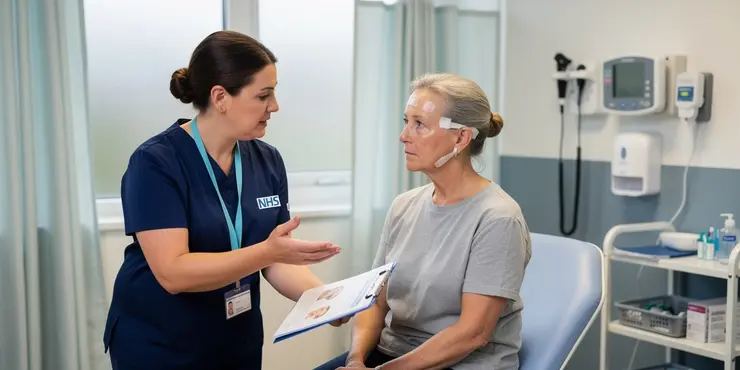
What is the recovery time for a facelift?
Relevance: 82%
-

How long do the results of a facelift last?
Relevance: 81%
-

Will I have visible scars after a facelift?
Relevance: 80%
-

What should I expect during a consultation for a facelift?
Relevance: 77%
-

How soon can I return to work after a facelift?
Relevance: 75%
-

How soon can I return to work after a facelift?
Relevance: 71%
-
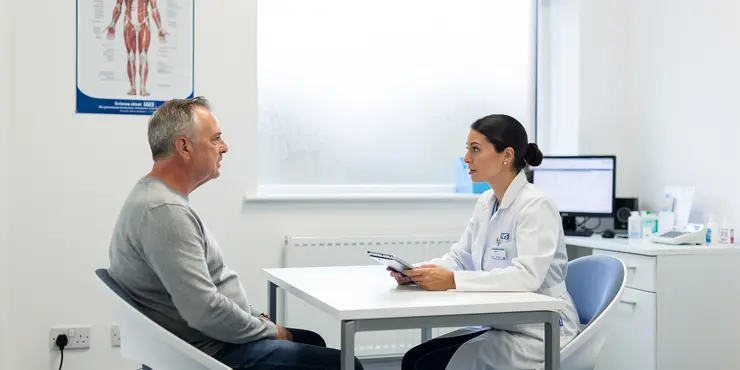
How should I prepare for a facelift?
Relevance: 71%
-

What are the common side effects after a facelift?
Relevance: 67%
-
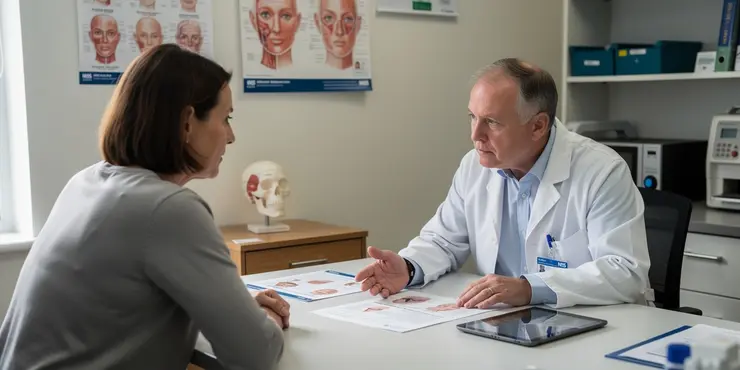
How is a facelift performed?
Relevance: 65%
-

Is financing available for a facelift?
Relevance: 61%
-

How do I choose a qualified facelift surgeon?
Relevance: 56%
-

What are the different types of facelifts?
Relevance: 35%
-

Are there risks associated with IVF?
Relevance: 33%
-

Who is at higher risk for thrombosis?
Relevance: 31%
-

What are the risk factors for thrombosis?
Relevance: 31%
-
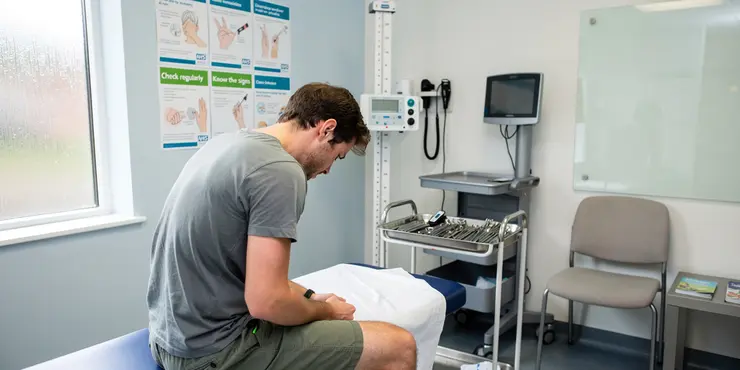
Who is at risk for testicular cancer?
Relevance: 31%
-

Who is at risk for developing BPH?
Relevance: 31%
-

Who is at risk of developing shingles?
Relevance: 31%
-

Am I more at risk of prostate cancer?
Relevance: 31%
-

Who is at risk of developing SAD?
Relevance: 31%
-
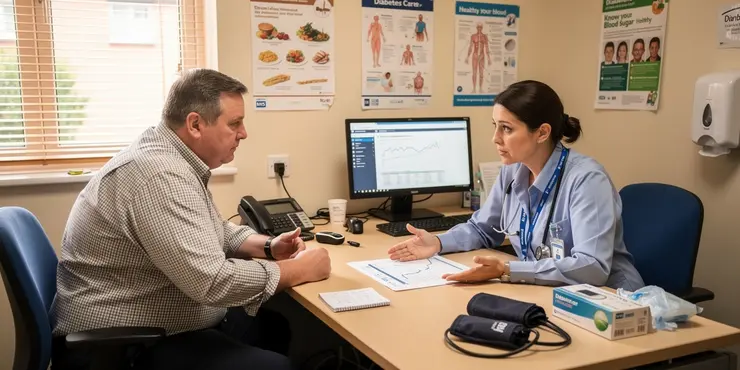
Who is at risk for flesh-eating disease?
Relevance: 31%
-

Who is at risk of developing eczema?
Relevance: 31%
-

What are the risks associated with a C-section?
Relevance: 31%
-

What are the risks associated with cryptocurrencies?
Relevance: 30%
-

Is there any risk of hypoglycemia with Mounjaro?
Relevance: 30%
-

Are there risks associated with blood transfusions?
Relevance: 30%
-

What is the risk of miscarriage? | NHS
Relevance: 30%
-
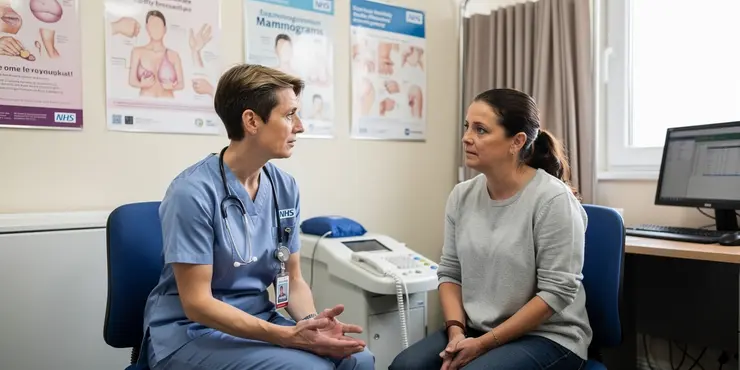
Are there any risks associated with mammograms?
Relevance: 30%
-

Are adults in the UK at risk from measles?
Relevance: 30%
-

What are the risk factors for bowel cancer?
Relevance: 29%
-

Is there a risk of thyroid tumors with Ozempic?
Relevance: 29%
Understanding Facelift Surgery
A facelift, technically known as a rhytidectomy, is a popular cosmetic procedure aimed at reducing the signs of ageing by tightening facial tissues. While many seek this surgery for its potential to rejuvenate their appearance, it's essential to understand the associated risks and considerations involved, particularly for those in the UK where the demand for elective cosmetic surgeries has been steadily increasing.
Common Risks and Complications
Like all surgical procedures, facelifts come with inherent risks. Some of the most common risks include scarring, hematoma, nerve injury, and hair loss at the incision sites. Scars are generally well-concealed around the ears and hairline but may take time to fade. Hematomas, which are collections of blood under the skin, can occur post-operatively and may require additional treatment.
Nerve injury, albeit rare, can lead to temporary or permanent facial muscle weakness. A minor risk is hair loss near the surgical incisions, which can sometimes be permanent. These complications emphasize the need for choosing a highly qualified and experienced surgeon to minimize risks.
Infection and Adverse Reactions
Infections, though not common, are a potential risk for any surgical procedure, facelifts included. Antibiotics are typically prescribed as a precaution. Patients may also experience adverse reactions to anesthesia, underscoring the importance of discussing any pre-existing health conditions or allergies with both the surgeon and anesthetist beforehand.
The Importance of Comprehensive Consultation
Anyone considering a facelift should engage in a thorough consultation process. During consultations, candidates should discuss their medical history, concerns, and expectations with their surgeon. This dialogue ensures that individuals are informed of the specific risks linked to their health profile and can make educated decisions.
An ethical and skilled surgeon will explain the procedure in detail, including post-operative care and the expected recovery timeline, thereby helping to mitigate anxiety and foster realistic expectations about the outcomes.
Considerations for Post-Operative Recovery
The recovery period after a facelift requires careful adherence to medical advice to prevent complications. Patients are usually advised to avoid strenuous activities, follow specific wound care instructions, and attend follow-up appointments. Swelling, bruising, and discomfort are typical post-operative experiences, although they resolve over time.
In the UK, some non-surgical treatments like fillers or botulinum toxin are growing popular for individuals seeking less invasive alternatives with shorter recovery times. These options, while not replacements for a facelift, may delay the need for surgical intervention.
Conclusion
Facelift surgery is a significant procedure with potential risks that require careful consideration. While complications are relatively uncommon, awareness and understanding of these risks can aid individuals in making informed choices. Seeking out a reputable clinic and surgeon is paramount to enhancing the safety and outcomes of the procedure. As with any medical treatment, being well-informed and thoughtful is essential across the UK and globally.
What is Facelift Surgery?
A facelift is a type of surgery. It helps make your face look younger. The doctor tightens the skin on your face. This surgery is popular with many people. Before you choose this surgery, it’s important to know about the risks. In the UK, more people are choosing to have cosmetic surgeries like this.
Possible Risks and Problems
All surgeries have risks. Some common problems with facelifts are scars, blood clots, nerve injury, and hair loss. Scars usually hide well near the ears and hairline, but they can take time to fade. Blood clots might happen under the skin and need more treatment.
Sometimes, nerves can get hurt. This is uncommon, but it can make your face weak. Hair might fall out near where the cuts are. This can be permanent. Choosing a good, experienced doctor can lower these risks.
Infections and Reactions
Infections can happen with any surgery, but they are not common. Doctors give medicine called antibiotics to help. Some people might react badly to the sleep medicine used during surgery. It’s very important to tell your doctor about any health problems or allergies you have before surgery.
Why Talking to Your Doctor is Important
If you want a facelift, you need to talk to your doctor first. This talk is called a consultation. You should tell the doctor about your health and what you hope to see after the surgery. This helps you know the risks for you and make smart choices.
A good doctor will tell you what happens during the surgery, how to care for yourself after, and how long you might take to feel better. This can help you know what to expect and feel less worried.
Recovery After Surgery
After surgery, you need to follow the doctor’s advice carefully. Don’t do any heavy lifting or exercise. You need to clean your wounds as told and go to check-ups with the doctor. It’s normal to feel sore and see some swelling and bruising, but this will get better.
In the UK, some people use treatments like fillers instead of surgery. These treatments don’t need as much recovery time. They can make you look younger for a while, but they don’t do as much as a facelift does.
Summary
A facelift is a big surgery and not without risks. Knowing about these risks helps you make better decisions. It’s very important to find a good doctor and clinic. This makes the surgery safer and the results better. Always be smart and know your facts before choosing any medical treatment, in the UK or anywhere else.
Frequently Asked Questions
What are the common risks associated with facelifts?
Common risks include bleeding, infection, scarring, and adverse reactions to anesthesia.
Can a facelift result in nerve damage?
Yes, there is a risk of nerve damage which can lead to numbness or muscle weakness, though it is usually temporary.
Is it possible to have an allergic reaction during a facelift?
Yes, patients can have allergic reactions to anesthesia or medications used during and after the procedure.
How likely is it to experience hematoma after a facelift?
Hematoma is a common complication, with varying reports suggesting between 1-5% of cases.
Can facelifts lead to excessive scarring?
While skilled surgeons aim to minimize scarring, poor healing can lead to more noticeable scars.
What is skin necrosis and how does it relate to facelifts?
Skin necrosis is the loss of skin tissue, and it can occur if blood supply is compromised during the procedure.
Is hair loss a risk associated with facelifts?
Hair loss around the incision sites can occur, though it is usually temporary.
How can infection be prevented post-facelift?
Proper wound care, hygienic practices, and following post-operative instructions can help prevent infections.
What are the signs of infection after a facelift?
Signs include redness, swelling, increased pain, fever, and pus or discharge from the incision sites.
What should patients know about anesthesia risks for facelifts?
Anesthesia carries risks such as respiratory complications, allergic reactions, and cardiovascular problems.
Are blood clots a potential risk of facelifts?
Yes, deep vein thrombosis (DVT) is a risk, but it is rare in this type of surgery.
What post-operative issues can affect facelift outcomes?
Poor wound healing, asymmetry, and unsatisfactory aesthetic results can affect outcomes.
Can smokers undergo facelifts safely?
Smoking increases the risk of complications, particularly with wound healing, and is usually discouraged before and after surgery.
How can patients minimize risks before having a facelift?
Choosing a qualified and experienced plastic surgeon, following pre-surgery instructions, and maintaining a healthy lifestyle can reduce risks.
Is there a risk of prolonged swelling or bruising after a facelift?
Swelling and bruising are common but should subside after a few weeks; prolonged symptoms should be discussed with a surgeon.
How does age affect the risks of a facelift?
Older patients may have a higher risk of complications due to decreased skin elasticity and other age-related health issues.
What impact does a patient's medical history have on facelift risks?
Chronic conditions such as diabetes and hypertension can increase the risk of complications during and after surgery.
Can psychological effects be a risk associated with facelifts?
Post-surgery, some patients may experience dissatisfaction or emotional distress if the results do not meet expectations.
Are revision surgeries common after facelifts?
While not common, some patients may seek revision surgery to correct or improve upon the initial results.
How important is post-surgical care in preventing facelift risks?
Proper post-surgical care is crucial as it aids healing, reduces the risk of complications, and helps achieve optimal results.
What risks can happen with face surgeries?
Some things that might go wrong are:
- Bleeding: When blood comes out of the body.
- Infection: When germs make you sick.
- Scarring: When your skin heals with a mark.
- Bad reaction to medicine that makes you sleepy (anesthesia).
If you need help with reading, you can ask someone to read it to you or use apps that read aloud. Writing down your questions and talking to a doctor can also help you understand better.
Can having a facelift hurt your nerves?
Yes, sometimes nerves can get hurt. This might make your skin feel numb or your muscles feel weak. But don't worry, it usually goes away after a while.
Can you have an allergy during a facelift?
Yes, people can have allergies to the medicine used to make them sleep during an operation or after it.
Will I get a bruise after a facelift?
A hematoma is when blood leaks and collects under the skin. This can happen sometimes. Out of every 100 people, 1 to 5 people might get a hematoma.
Can having a facelift cause too many scars?
Doctors do their best to make scars small. But sometimes, the body doesn't heal well, and the scars can be bigger.
What is Skin Necrosis and How Does It Relate to Facelifts?
Skin necrosis is when skin cells die. This can happen if the skin doesn't get enough blood.
After a facelift, sometimes not enough blood goes to the skin. This can cause skin necrosis. Doctors watch for this to make sure the skin heals well.
Using simple words and pictures can help understand this. Talking to a doctor can also help if you have more questions.
Skin necrosis means when skin gets damaged or dies. This can happen if skin does not get enough blood during a medical procedure.
Can you lose hair from a facelift?
Sometimes hair might fall out where you had surgery. But don't worry, it usually grows back.
How can you stop infection after a facelift?
A facelift is an operation to make your face look younger. After the operation, it’s important to keep your face clean to stop germs.
Here are some tips to help:
- Wash your hands: Always wash your hands before touching your face.
- Keep bandages dry: Make sure your bandages are dry and clean.
- Listen to the doctor: Follow the doctor’s instructions carefully.
- Ask questions: If you are unsure, ask your doctor or nurse for help.
These tips can help you heal well after your facelift.
Taking care of cuts, keeping clean, and listening to the doctor’s instructions can stop infections.
How can you tell if there is an infection after a facelift?
After a facelift, there might be signs that show things are not healing well. Here are some easy things to look for:
- Redness: Is the skin redder than normal?
- Swelling: Is there more puffiness than expected?
- Pain: Does it hurt more than you think it should?
- Heat: Is the area warmer than usual?
- Pus: Is there any yellow or green stuff coming out?
If you see any of these signs, talk to a doctor. They can help you feel better.
You can also use pictures or notes to help remember these signs. Ask someone to go with you to the doctor if you need help.
Signs you might notice are red skin, swelling, more pain, fever, and pus or liquid coming out from where you have a cut.
What do people need to know about risks of sleep medicine for face surgery?
When you have face surgery, doctors use sleep medicine. This helps you not feel pain. But, sleep medicine has some risks.
Here are some things you should know:
- Sleep medicine can make you feel sick after the surgery. You might feel dizzy or want to throw up.
- Some people might have a bad reaction to sleep medicine. This is rare, but it can be serious.
- Talk to your doctor about any worries. They can help you understand and feel better.
- Tell the doctor if you have allergies or have had problems with sleep medicine before.
If you find reading hard, ask someone to read with you. You can also use a screen reader to help you listen to the information.
Anesthesia can have risks. These include breathing problems, allergies, and heart problems.
Here are some tips to help understand:
- Ask a doctor to explain in simple words.
- Write down new words and look them up.
- Use pictures or videos to learn more.
Can getting a facelift cause blood clots?
When you have a facelift, there is a small chance you might get blood clots. Blood clots are clumps of blood that can block your veins. This is something to talk to your doctor about before you decide to have a facelift.
If you worry about this, ask your doctor how they help keep you safe. You can also ask them to explain in simple words what they will do during the facelift and what you should do after to stay healthy.
Using a tool that reads the text out loud or drawing pictures of what you learn can help make it easier to understand.
Having a blood clot called deep vein thrombosis (DVT) is a risk. But it does not happen often with this kind of surgery.
What problems can happen after a facelift?
Sometimes, wounds don't heal well. This can cause problems. One side of the body might not look like the other (this is called asymmetry). People might also not be happy with how they look after. These things can make the result worse.
To understand better, you can:
- Ask your doctor questions.
- Use simple explanations or pictures to help.
- Talk to someone who can explain it in a way that's easy to understand.
Can people who smoke have a safe facelift?
If you smoke, you might wonder if it is safe to have a facelift. A facelift is a surgery to make your face look younger. People who smoke need to be extra careful with surgery. Smoking can make healing slower and cause problems. It is important to talk to your doctor. They can tell you what to do.
Here are some tips:
- Tell your doctor if you smoke.
- Ask your doctor if you need to stop smoking before surgery.
- Follow all the doctor's advice for a safe surgery.
Using online tools like videos or pictures can help you understand more about facelifts and smoking. Also, ask someone you trust to explain things to you if you need help.
Smoking makes it harder for your body to heal after surgery. Doctors say it is not a good idea to smoke before or after surgery.
How can people stay safe before a facelift?
A facelift is an operation to make your face look younger. Before you have a facelift, there are things you can do to stay safe.
Here are some tips to help you:
- Talk to your doctor. Ask lots of questions.
- Make sure you are healthy before the operation.
- Tell your doctor about any medicines you take.
- Stop smoking if you smoke. Smoking can make it harder to heal.
- Follow your doctor's advice about eating and drinking.
Ask someone to help you understand the information. Bring a friend or family member to your appointments.
Pick a good and experienced doctor for plastic surgery. Follow their instructions before the surgery. Eat healthy food and stay active to lower risks.
Can your face stay swollen or bruised for a long time after a facelift?
It's normal to have some swelling and bruising after an operation. This should get better in a few weeks. If it doesn't, talk to your doctor. They can help you.
Does age change how safe a facelift is?
Older people might have more health problems. Their skin is less stretchy, and they might have other health issues because they are older.
How does a person's past health affect facelift risks?
A person’s past health can change the risks of having a facelift. Here are some ways it can make a difference:
- If someone had health problems before, it could make surgery riskier.
- Doctors may need to take extra care if a person has certain health issues.
- Medicines you take can also change the risks of surgery.
It's important to talk to your doctor about your past health.
Here are some things that can help:
- Write down your health history before visiting the doctor.
- Ask someone to come with you to the doctor to help remember what is talked about.
- Ask questions if you don't understand something.
Long-term health problems like diabetes and high blood pressure can make surgery more risky. This can happen during surgery and even after it's done.
Can a facelift affect how you feel inside?
After surgery, some people might feel upset or unhappy if they don't like how the surgery turned out.
Do people often need another surgery after a facelift?
Sometimes, people want to have surgery again to make things better. This is not very common.
Why is taking care of your face after surgery important?
Looking after yourself after surgery is very important. It helps your body heal, keeps you safe from problems, and makes you feel better.
Useful Links
This website offers general information and is not a substitute for professional advice.
Always seek guidance from qualified professionals.
If you have any medical concerns or need urgent help, contact a healthcare professional or emergency services immediately.
Some of this content was generated with AI assistance. We’ve done our best to keep it accurate, helpful, and human-friendly.
- Ergsy carfully checks the information in the videos we provide here.
- Videos shown by Youtube after a video has completed, have NOT been reviewed by ERGSY.
- To view, click the arrow in centre of video.
- Most of the videos you find here will have subtitles and/or closed captions available.
- You may need to turn these on, and choose your preferred language.
- Go to the video you'd like to watch.
- If closed captions (CC) are available, settings will be visible on the bottom right of the video player.
- To turn on Captions, click settings .
- To turn off Captions, click settings again.
More Items From Ergsy search
-

Are there any risks associated with facelifts?
Relevance: 100%
-

What is a Facelift?
Relevance: 96%
-

What is a mini facelift?
Relevance: 92%
-

Is a facelift painful?
Relevance: 90%
-

Are non-surgical facelifts effective?
Relevance: 89%
-

Who is an ideal candidate for a facelift?
Relevance: 85%
-

Will a facelift remove all my wrinkles?
Relevance: 84%
-

Can a facelift be combined with other procedures?
Relevance: 83%
-

How much does a facelift cost?
Relevance: 83%
-

What is the recovery time for a facelift?
Relevance: 82%
-

How long do the results of a facelift last?
Relevance: 81%
-

Will I have visible scars after a facelift?
Relevance: 80%
-

What should I expect during a consultation for a facelift?
Relevance: 77%
-

How soon can I return to work after a facelift?
Relevance: 75%
-

How soon can I return to work after a facelift?
Relevance: 71%
-

How should I prepare for a facelift?
Relevance: 71%
-

What are the common side effects after a facelift?
Relevance: 67%
-

How is a facelift performed?
Relevance: 65%
-

Is financing available for a facelift?
Relevance: 61%
-

How do I choose a qualified facelift surgeon?
Relevance: 56%
-

What are the different types of facelifts?
Relevance: 35%
-

Are there risks associated with IVF?
Relevance: 33%
-

Who is at higher risk for thrombosis?
Relevance: 31%
-

What are the risk factors for thrombosis?
Relevance: 31%
-

Who is at risk for testicular cancer?
Relevance: 31%
-

Who is at risk for developing BPH?
Relevance: 31%
-

Who is at risk of developing shingles?
Relevance: 31%
-

Am I more at risk of prostate cancer?
Relevance: 31%
-

Who is at risk of developing SAD?
Relevance: 31%
-

Who is at risk for flesh-eating disease?
Relevance: 31%
-

Who is at risk of developing eczema?
Relevance: 31%
-

What are the risks associated with a C-section?
Relevance: 31%
-

What are the risks associated with cryptocurrencies?
Relevance: 30%
-

Is there any risk of hypoglycemia with Mounjaro?
Relevance: 30%
-

Are there risks associated with blood transfusions?
Relevance: 30%
-

What is the risk of miscarriage? | NHS
Relevance: 30%
-

Are there any risks associated with mammograms?
Relevance: 30%
-

Are adults in the UK at risk from measles?
Relevance: 30%
-

What are the risk factors for bowel cancer?
Relevance: 29%
-

Is there a risk of thyroid tumors with Ozempic?
Relevance: 29%


